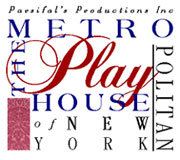REIGNING SUPREME!
Monay, Monay, Monay, Monay, MONAY! If the seemingly heartless Irish tycoon Michael R. Regan (a fantastic Dave Hanson) had a theme song in the beginning of Edward Sheldon’s 1911 melodrama The Boss, it would be the 70’s O’Jays’ classic, 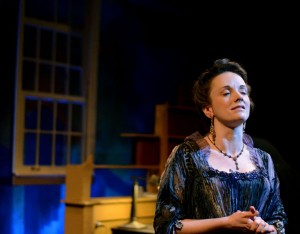 “For the Love of Money.” Despite a 60-year gap in storylines and period, the theme is the same: people want money, and some of them will stomp on anyone who doesn’t have it. But greed is not the only theme that traverses timelines in this play. Unrequited love, class distinctions, gender inequality, politics, and sacrifice can also be found. Yet, despite the familiarity of the subject matter, there is nothing commonplace about this sumptuous Metropolitan Playhouse production. Stellar acting, marvelous set design, gorgeous period costumes, and brilliant staging make The Boss an experience that’s not to be missed.
“For the Love of Money.” Despite a 60-year gap in storylines and period, the theme is the same: people want money, and some of them will stomp on anyone who doesn’t have it. But greed is not the only theme that traverses timelines in this play. Unrequited love, class distinctions, gender inequality, politics, and sacrifice can also be found. Yet, despite the familiarity of the subject matter, there is nothing commonplace about this sumptuous Metropolitan Playhouse production. Stellar acting, marvelous set design, gorgeous period costumes, and brilliant staging make The Boss an experience that’s not to be missed.
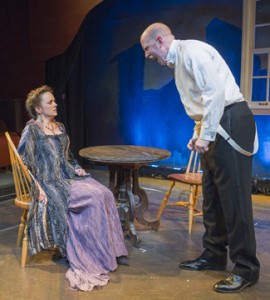 You’d have to be trying really hard to be oblivious to the tensions and rifts that monay’”ahem’”money and power create in The Boss. From the opening sequences, patriarch James D. Griswold (Richard Cottrell) all but quakes in his shoes at the thought of losing his business to Regan, a shark who has been sweeping up the local grain and workforce contracts. Despite employing the help of his stuffy son Donald (Erik Gullberg) to try to ward him off, it is his daughter Emily (an infectious and graceful Meghan Hoffman), a genteel, educated woman with a soft spot for the poor, that comes up with a solution: in order for her family to keep half of their business, she offers her much sought-after hand in marriage to Regan. Instead of being grateful for her martyrdom, Emily’s brother treats her like a traitor and makes her sacrifice even more challenging. Fortunately, during the course of her false marriage, Emily finds out that she is not the only one that will go out of her way for love and family.
You’d have to be trying really hard to be oblivious to the tensions and rifts that monay’”ahem’”money and power create in The Boss. From the opening sequences, patriarch James D. Griswold (Richard Cottrell) all but quakes in his shoes at the thought of losing his business to Regan, a shark who has been sweeping up the local grain and workforce contracts. Despite employing the help of his stuffy son Donald (Erik Gullberg) to try to ward him off, it is his daughter Emily (an infectious and graceful Meghan Hoffman), a genteel, educated woman with a soft spot for the poor, that comes up with a solution: in order for her family to keep half of their business, she offers her much sought-after hand in marriage to Regan. Instead of being grateful for her martyrdom, Emily’s brother treats her like a traitor and makes her sacrifice even more challenging. Fortunately, during the course of her false marriage, Emily finds out that she is not the only one that will go out of her way for love and family.
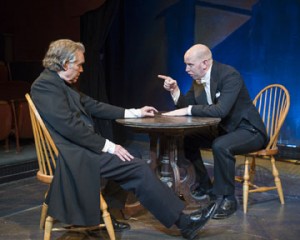 Undeterred by a small thrust stage, hardworking artistic director Alex Roe stages this larger-than-life, clever play beautifully. Every moment is carefully manicured, and every angle thoughtfully planned for the audience’s enjoyment. From the foot traffic created by the passersby in the town to the harrowing fight scenes, Roe draws you into every intimate moment with his masterful direction and vision. Aided by a terrific team of nine set builders, Roe captures this unspecific worker’s town with a gorgeous, industrial backdrop where windows are added for a tense standoff between Regan and the townspeople.
Undeterred by a small thrust stage, hardworking artistic director Alex Roe stages this larger-than-life, clever play beautifully. Every moment is carefully manicured, and every angle thoughtfully planned for the audience’s enjoyment. From the foot traffic created by the passersby in the town to the harrowing fight scenes, Roe draws you into every intimate moment with his masterful direction and vision. Aided by a terrific team of nine set builders, Roe captures this unspecific worker’s town with a gorgeous, industrial backdrop where windows are added for a tense standoff between Regan and the townspeople.
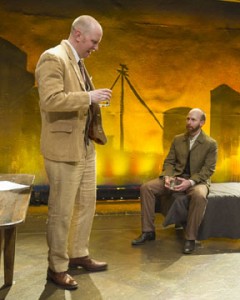 There is conflict at nearly every turn of The Boss, and the cast does an excellent job of carrying it. From Emily’s internal struggles to the fisticuffs that nearly explodes between Regan and Archbishop Sullivan (the deliciously seedy John Fennessy, the church presence of the play), the acting is always dynamic and the scene transitions are always seemless. And indeed it must be in order to pull off Sheldon’s meaty material.
There is conflict at nearly every turn of The Boss, and the cast does an excellent job of carrying it. From Emily’s internal struggles to the fisticuffs that nearly explodes between Regan and Archbishop Sullivan (the deliciously seedy John Fennessy, the church presence of the play), the acting is always dynamic and the scene transitions are always seemless. And indeed it must be in order to pull off Sheldon’s meaty material.
The script illustrates that no matter how disparate the people are and how disdainfully some are treated, each person is essential for daily living. Management needs the working class, and the workers need the boss. And much like the material, each member of Metropolitan Playhouse’s cast and crew do far more than earn their keep.
photos by Jacob J. Goldberg and Sarah Jun
The Boss
Metropolitan Playhouse in New York City
scheduled to end on December 16th, 2012
for tickets, call 800-838-3006 or visit http://www.metropolitanplayhouse.org/boss
